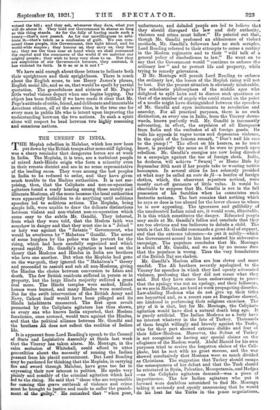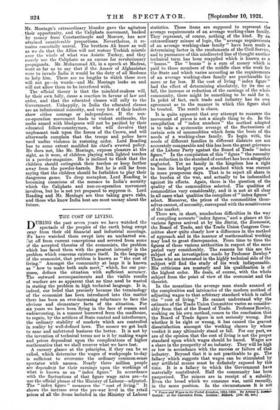111E UNREST IN INDIA.
THE Moplah rebellion in Malabar, which has now been put down by the British troops after some stiff fighting, was a sharp reminder that dangerous forces are at work in India. The Moplahs, it is true, are a turbulent people of mixed Arab-Hindu origin who form a minority even in their remote district and are in no sense representative of the leading races. They were among the last peoples in India to be reduced to other, and they have given much trouble to the Madras authorities. It is not sur- prising, then, that the Caliphate and non-co-operation agitators found a ready hearing among these unruly and illiterate Moslems, all the more because the local authorities were apparently forbidden to do anything until seditious speeches led to seditious actions. The Moplahs, being simple folk, were unable to draw the delicate distinctions between violent and non-violent non-co-operation which come easy to the subtle Mr. Gandhi. They inferred, from what they were told, that the Moslem faith was somehow in danger and that they must rise in a " Jehad " or holy war against the " Satanic " Government, who would be overborne by " Mahatma " Gandhi. The arrest of some burglars by the police was the pretext for the rising, which had been carefully organized and which spread rapidly. Mr. Gandhi's agitation is based on the theory that Moslems and Hindus in India are brothers who love one another. But when the Moplahs had gone on the war-path, they ignored the "Mahatma's " theory and proceeded to assault and rob all non-Moslems, giving the Hindus the choice between conversion to Islam and death. The few British residents suffered in person or in property, but the large Hindu majority suffered a great deal more. The Hindu temples were sacked, Hindu houses were burned, and many Hindus were murdered. But for the swift intervention of the British Army and Navy, Calicut itself would have been pillaged and its Hindu inhabitants massacred. The first open revolt promoted by the Caliphate agitators has thus shown, as every one who knows India expected, that Moslem fanaticism, once aroused, would turn against the Hindus, and that the political alliance between Mr. Gandhi and the brothers All does .not reflect the realities of Indian life.
It is apparent from Lord Reading's speech to the Council of State and Legislative Assembly at -Simla last week that the Viceroy has taken alarm. Mr. Montagu, in the calm seclusion of Whitehall, could afford to utter generalities about the necessity of rousing the Indian peasant from his placid contentment. But Lord Reading may be pardoned for thinking that the Moplahs, in carrying fire and sword through Malabar, have gone too far in expressing their new interest in politics. He spoke very plainly and sensibly of the criminal agitation which had led to the rising. He said that "those who are responsible for causing this grave outbreak of violence and crime must be brought to justice and made to suffer the punish- ment of the -Aunty." He..remarked that " when poor, unfortunate, and deluded people are led to believe that they should disregard the law and defy authority, violence and crime must follow." He pointed out that, though Mr. Gandhi professed an abhorrence of violent ' methods Mr. Gandhi's followers had no such scruples. Lord Reading referred to their attempts to cause a mutiny in the Moslem regiments and to their " wild talk of a general policy of disobedience to law." Ho went on to say that the Government would " continue to enforce the ordinary law " and to protect life and property, while trying to remedy grievances. If Mr. Montagu will permit Lord Reading to enforce the ordinary law, the lesson of the Moplah rising will not be lost. But the present situation is obviously intolerable. The scholastics philosophers of the middle ages who delighted to split hairs and to discuss such questions as that of the number of angels who could stand on the point of a needle might have distinguished between the speeches of Mr. Gandhi and open incitements to revolution and anarchy. For all practical purposes, there is no such distinction, as every one in India, from the Viceroy down- wards, knows perfectly well. Mr. Gandhi is incessantly advocating, in effect, the expulsion of all Europeans from India and the exclusion of all foreign goods. Ho veils his appeals in vague terms and deprecates violence, in the spirit of the famous remark, " Don't nail his ears to the pump.1" The effect on his hearers, as he must know, is precisely the same as if ho were to preach open rebellion. Mr. Gandhi's energies are now being directed to a oampaign against the use of foreign cloth. India, he declares, will achieve " Swaraj " or Home Rule by September 30th next if her people take to wearing native homespun. In several cities he has solemnly presided at what may be called an auto da fa—a bonfire of foreign clothes, which, the observant reporters noticed, were mostly cast-off garments of little value. It would be charitable to suppose that Mr. Gandhi is not in the full possession of his faculties when he enunciates such fantastic notions. The fact remains that nothing which he says or does is too absurd for the lower classes to whom he is now appealing. The ignorance and gullibility of the uneducated Indian mind are, it would seem, illimitable. It is this which constitutes the danger. Educated people may smile at Mr. Gandhi's follies and conclude that they are too obvious and too ludicrous to delude a child. The truth is that Mr. Gandhi commands a groat deal of support, and that the extreme tolerance—to put it mildly—which the Government accord to him has assisted his subversive campaign. The populace concludes that Mr. Montagu is afraid of Mr. Gandhi, and we aro by no means sem.° that the populace is wrong. Thus the very foundations of the British Raj are shaken. Mr. Gandhi's Moslem allies are less clever and more candid. The All brothers recently apologized to the Viceroy for speeches in which they had openly advocated violence, professing that they did not mean what they said. But they have since been endeavouring to prove that the apology was not an apology, and their followers, as we see in Malabar, are hard at work propagating disorder. Law-abiding Moslems who do not give up their titles are boycotted and, as a recent case at Bangalore showed, are hindered in performing their religious exercises. The pity of it is that, but for Mr. Montagu, the Caliphate agitation would have died a natural death long ago. It is purely artificial. The Indian Moslems as a body have no interest whatever in the fate of Turkey. Thousands of them fought willingly and bravely against the Turks, who for their part showed extreme dislike and fear of their fellow-Moslems. Moreover, the Sultan of Turkey is not recognized as having any special claims on the allegiance of the Moslem world. Abdul Hamid for his own purposes tried to revive the forgotten claims of the Cali- phate, but he met with no great success, and the war showed conclusively that Moslems were as much divided as Christians. The suggestion that Turkey should escape the consequences of her defeat and that the Turk should be reinstated in Syria, Palestine, Mesopotamia, and Hedjaz —as the Caliphate agitators demand—was a piece of impertinence. The few Indian agitators who put it forward were doubtless astonished to find Mr. Montagu taking it seriously and openly announcing that he would do his beat for the Turks in the peace negotiations. Mr. Montagu's extraordinary blunder gave the agitators . their opportunity, and the Caliphate movement, backed by money from Constantinople and Moscow, has now attained considerable proportions. Nevertheless, it re- mains essentially unreal. The brothers All know as well as we do that the Allies will not restore Turkish misrule over the whole of what was Asiatic Turkey, and they merely use the Caliphate as an excuse for revolutionary propaganda. Mr. Muhammad Ali, in a speech at Madras, went so far as to say that if the Ameer of Afghanistan were to invade India it would be the duty of all Moslems to help him.' There are no lengths to which these men will not go—in words—and Mr. Montagu looks on and will not allow them to be interfered with.
The official theory is that the mischief-makers will, by their own folly, cause a reaction in favour of law and order, and that the educated classes will rally to the Government. Unhappily, in India the educated classes are an infinitesimal minority, and very few of their leaders show either courage or independence. If the non- co-operation movement leads to violent outbreaks, the mobs armed with bludgeons will not be pacified by their educated fellow-countrymen, who will devolve that unpleasant task upon the forces of the Crown, and will afterwards complain that the troops and police have used undue violence in restoring order. Lord Reading has to some extent modified his chief's avowed policy. He does not, like Mr. Montagu, express pleasure at the sight, as it were, of children playing with lighted torches in a powder-magazine. He is inclined to think that the children should extinguish their torches or keep farther away from the powder-barrels. But he is still far from saying that the children should be forbidden to play their dangerous game. To drop metaphor, Lord Reading is becoming conscious of the menace to India's security which the Caliphate and non-co-operation movement involves, but he is not yet prepared to suppress it. Lord Reading and Mr. Montagu are thus taking grave risks, and those who know India best are most uneasy about the future.



































 Previous page
Previous page